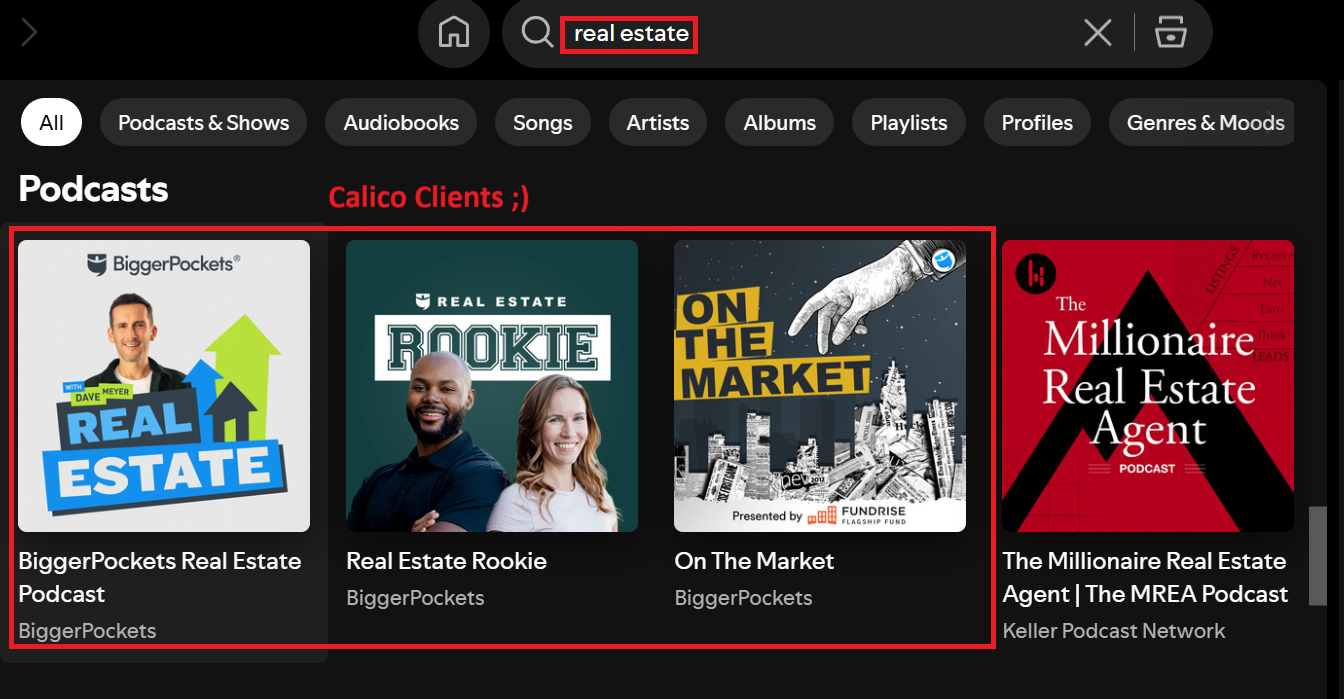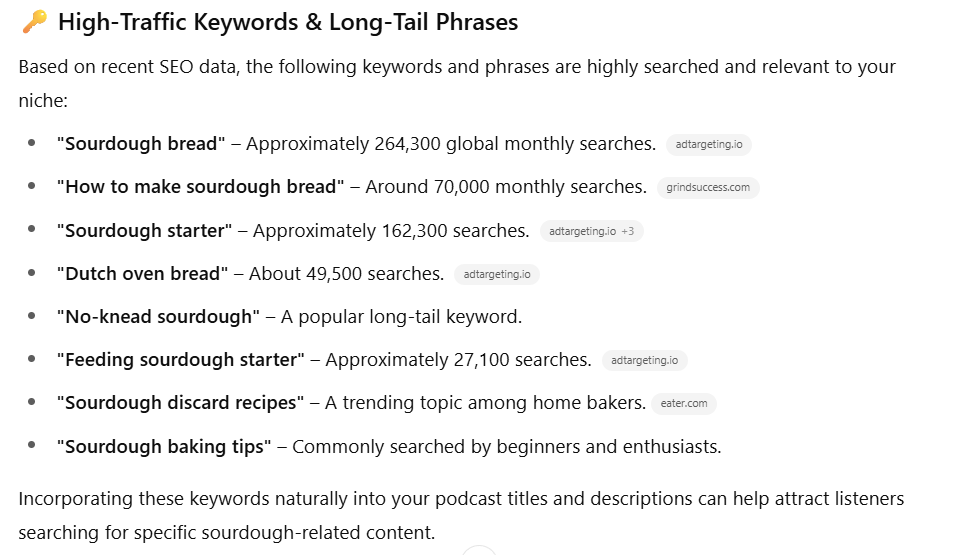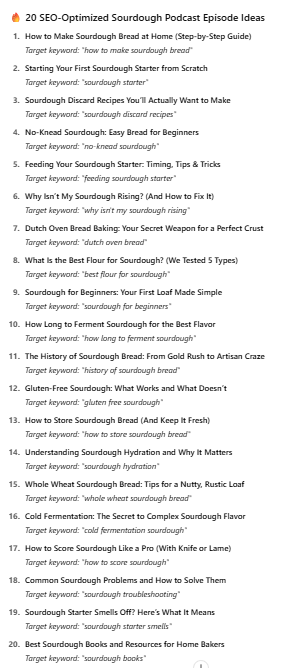Podcast SEO: How to Rank #1 (From Someone Who’s Done It)
Podcast SEO is a crucial key to growing your show. How do I know? Well, all of the podcasts I work on rank, and many of them rank the highest in their specific niche. How’d we do it? I’m going to tell you, so you can repeat it for your podcast, too.
I’ve spent the entirety of my career in SEO and podcasting. The first portion was working at a lean SEO agency strategizing new content production for our clients. The second portion was working with podcast networks to target their shows to the right audience.
I’ve succeeded and failed in numerous ways at both, but one thing I was always dead set on: driving traffic/new listeners and increasing reach. You can do the same. Here’s how.
SEO for Podcasts: Why You Should Really Care
SEO stands for “Search Engine Optimization” and is traditionally a term used for ranking on Google. Nowadays, SEO for podcasts means ranking on Google, Apple Podcasts, Spotify, YouTube and more.
The higher you rank in a podcast platform, YouTube, or Google, the higher chance you have to gain a new listener interested in your niche. More searchers seeing your show means more listeners, more people hearing your story, your advice, and your message. This also means more listeners for higher revenue via advertising.
Work with the experts in podcast SEO!
The Ingredients of Perfect Podcast SEO (Broken Down)
There are a few crucial pieces of your podcast copy that will significantly help (or hurt) your discoverability to new listeners.
1. Show Title
This is the title of the show you’re producing. Let’s say you run a podcast about brewing kombucha or making kimchi. Here are some creative, but not terribly optimized title options:
Fermentation Friends
Microbiome Brews, Drinks, and Delicious Eats
The Smellier the Better
They’re all very creative, but most likely won’t show up when an adventurous home cook looks up a podcast about kimchi making. Adding some more targeted keywords to your title will help you show up when a searcher wants to find a podcast about their new favorite hobby.
Fermentation Friends: A Kombucha Brewing Podcast
Microbiome Eats: Making Kimchi and More Bubbly Delights
The Smellier the Better: The Fermented Food-Maker’s Podcast
Obviously, these make the titles a bit longer, but also help expand your reach to:
People brewing kombucha
People making kimchi
Those who like fermented foods
Etc.
This is a very random example, since not all podcasts (like making Kombucha) fit nicely into a pre-defined niche.
2. Episode Title
Episode titles are where you can really dig down and plug keywords, topics, and other search terms that your (potential) audience wants to know about.
Titling Best Practices
Titles should follow a few best practices to not only rank, but entice listeners to click:
Keep important keywords/clickthrough triggers at the top of your title: This ensures that those scanning the title before choosing an episode will see the most critical part of the episode topic before the title potentially truncates off. Back to our previous example, keywords could be “Brewing Kombucha” “Homemade Kimchi” “Yeast Activation" “Kimchi not Fermenting” “Jun Kombucha” “Homemade Kombucha” “How to Make Kimchi” “Kimchi Making Tips”.
Length can vary, but keyword positioning shouldn’t: There are successful podcasts that use two words as their title, and there are successful podcasts that use 25+ words in their title *cough* Diary of a CEO *cough*. While shorter and more concise is usually better, I haven’t found any correlation between length of title and performance. What does matter is keeping your keyword and clickthrough rate (CTR) triggers (as discussed above) at the top.
Title differently for each platform: Different audiences react in different ways. I’ve seen Apple and Spotify audiences love positive news but hate negative news, while YouTube audiences love negative news and hate positive news. Some things to be aware of per platform:
Apple Max Title Length (Before Truncating): 60 characters
Spotify Max Title Length (Before Truncating): ≈ 80 characters (I tested it)
YouTube Max Title Length (Before Truncating): ≈ 75 characters (I tested it)
3. Description Copy
Your description serves a dual purpose and you can (and should) optimize for both:
It tells new and returning listeners why they should tune into this specific episode. It targets the right people and hooks them in so they give those first few minutes a shot.
It helps the podcast platform/YouTube algorithms rank your episode for the right terms.
This means you should be organically plugging keywords throughout your description, wherever relevant. This also means the first two sentences are incredibly important for hooking potential listeners. This is your shot to give your episode a chance. Don’t screw it up.
Let’s take an episode about making sourdough starter from scratch, here’s what the first two lines could be.
“You’re struggling with how to make sourdough from scratch, but one simple trick could allow your starter to rise to new heights. Stop making the kitchen a mess, I’m sharing my #1 hack to get sourdough starter bubbling so you don’t have to buy it from the store…again.
4. Podcast/YouTube Tags
Podcast/YouTube tags are essentially keywords you’re upfront telling the platform that you’re targeting. For YouTube the max character count is 500. For Spotify/Apple, you can add around 20 tags per episode.
From Google:
“Tags are descriptive keywords you can add to your video to help viewers find your content. Your video’s title, thumbnail, and description are more important pieces of metadata for your video’s discovery…Tags can be useful if the content of your video is commonly misspelled. Otherwise, tags play a minimal role in your video's discovery.”
5. Chapters
Timestamps or “chapters” are a useful way to help listeners know what’s coming up in an episode and, if they need to, skip to the most relevant part for them.
Chapters are available for Apple, Spotify, and YouTube and should be used not only to 1. Improve the listener experience, but 2. To give the algorithm another reason to rank you.
This means you should be using your episode’s keywords in the chapters when relevant. Chapters can be 2-5 words, not excessively long so people can scan, and include more simple/eye-catching language (numbers, all caps, etc.)
Chapters may look like:
00:00 The Perfect Sourdough Starter
05:32 NEVER Add This Ingredient
10:12 Why Isn’t It Rising?
13:46 Where to Keep Sourdough Starter
17:10 Should It…Smell?
Ask Yourself: “Is My Content…Good?”
We’ve walked through the different parts of a podcast episode and how to increase your discoverability by optimizing for podcast SEO. But you know what helps podcasts get discovered and rank higher than other podcasts?
When people listen to them!
It would be ludicrous to assume that you can “hack” your way to the highest-ranking podcast in your niche without being the best show and producing the best content. Podcast and YouTube algorithms care about one thing: Keeping listeners and watchers on the platform. That means the longer they listen to your episode and the more they come back to listen to your other episodes, the higher chance you have of the algorithm not only ranking you but recommending you to other users.
Metrics to Watch
A few key metrics will tell you whether your show is actually…good (you can get these from Apple/Spotify):
Average Listen Time
How much of your podcast are listeners actually consuming? If you run 45-minute shows but your average listen time is only 12 minutes, how much value are you actually delivering? Should you trim your show or tweak the format so people stick around for longer?
Week-Over-Week Downloads
Better content means more recommendations not only from the algorithm but from listeners. Your week-over-week downloads should be growing steadily, but be aware that your specific niche may have seasonality (gardening podcasts rarely do well in the dead of winter!).
Week-Over-Week Listeners
Not only should your downloads be growing week-over-week, but your listenership should as well. More listeners AND more downloads means a much wider reach for your show. This is what algorithms want to see to recommend you.
Grow your podcast reach faster with curated podcast SEO and copywriting!
Podcast Keyword Research
You’ve assessed that your show does not suck. Congrats! Content can always be improved, but if you're doing solid work as is and putting little thought into podcast SEO, this is where to start.
There are numerous tools you can pay for to do podcast keyword research:
Ausha - truly the first-of-it’s-kind SEO software for podcasts
Ahrefs - a classic SEO keyword research tool that can help you track Google volume, and by (somewhat) proxy, podcast keyword volume
Semrush - Another classic SEO tool
All of these cost some amount of money (sorry). Thankfully, you can still do keyword research for free, with AI.
Type this prompt into your favorite AI engine:
I host a podcast about [insert your podcast topic, e.g., sourdough bread making]. Can you suggest high-traffic, relevant keywords I should target in my titles and descriptions to grow my audience? Please focus on terms with strong SEO potential, long-tail phrases, and questions that people commonly search for related to this topic on podcast platforms. Also include any trends or seasonal patterns if applicable.
I did this exact prompt on ChatGPT 4o and got this:
You can go a step further by sending this prompt:
Great. Now please give me 20 show ideas each targeting a different, relevant keyword.
Now we’ve got 20 show ideas to work with. Just remember, AI is NOT good at being creative. Some of these are good ideas to fill a keyword void, but you (the podcast/producer) know your audience better than AI. Your titles will be better, your ideas will be better. Use AI as a tool for ideation NOT the ideation itself.
Competitor Research
If you’re having trouble coming up with keywords or topics to target, remember that your competitors (if you have any) have probably already tried out a topic. Spotify now shows “plays” for podcasts. If your competitor is big enough, you can see whether their topic performed well or not based on the “plays.”
If your competitors have a YouTube channel, see how their views did when touching on certain topics. Just because something did well/poorly for them doesn’t mean it will be the same for you. But, if a competitor put out a solid piece of content on a topic that bombed, it may not have much interest (or have been released at the wrong time).
Here’s a channel called “Garden Talk with Mr. Grow It” that I’m 99.9% sure now is talking about a certain type of plant that people really like.
Regardless of the topic, you can see with the VidIQ free browser plugin which of his podcast episodes have outperformed his channel average.
You can repeat this simple, but effective, research with any topic. If you find there are no podcasts talking about your specific niche, but lots of online information about it, there’s a good chance that:
You could be the first to share the information via audio
There’s a reason this topic doesn’t perform well on audio
That’s for you to find out!
Get Out There and Go Rank
Your content deserves to be heard by the masses, the main way to reach them? Podcast SEO. Now you know enough to start tweaking your titles, descriptions, and tags. But remember, the key ingredient to ranking a podcast isn’t technical tweaks—it’s good content!
Need an experienced podcast SEO expert? Book a free intro call!
Podcast SEO FAQs
Does SEO work for Podcasts?
Yes, SEO best practices will help your podcast rank on audio and video platforms. By targeting keywords and search intent, you can expand your audience and grow your listenership.
How Do I Get 1,000 Listeners for My Podcast?
To get your first 1,000 listeners, ensure your podcast title and description are targeted correctly, invite other more prominent members of your community’s niche to speak on your podcast, apply to speak on other related podcasts, and test content formats again and again.
Does Spotify Have SEO?
Yes, Spotify will take into account crucial SEO factors like your titles, descriptions, timestamps, and listenthrough and download metrics. Discoverability is high on Spotify, and new listeners are constantly searching up new terms to find new podcasts.





